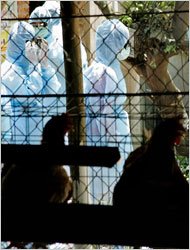Avian Flu Wanes in Asian Nations it First Hit Hard
The New York Times
2006 May 14
DONALD G. McNEIL Jr.
Photo courtesy of France-Presse--Getty Images Even as it crops up in the far corners of Europe and Africa, the virulent bird flu that raised fears of a human pandemic has been largely snuffed out in the parts of Southeast Asia where it claimed its first and most numerous victims.
Even as it crops up in the far corners of Europe and Africa, the virulent bird flu that raised fears of a human pandemic has been largely snuffed out in the parts of Southeast Asia where it claimed its first and most numerous victims.
Health officials are pleased and excited. "In Thailand and Vietnam, we've had the most fabulous success stories," said Dr. David Nabarro, chief pandemic flu coordinator for the United Nations.
Vietnam, which has had almost half of the human cases of A(H5N1) flu in the world, has not seen a single case in humans or a single outbreak in poultry this year. Thailand, the second-hardest-hit nation until Indonesia recently passed it, has not had a human case in nearly a year or one in poultry in six months.
Encouraging signs have also come from China, though they are harder to interpret.
These are the second positive signals that officials have seen recently in their struggle to prevent avian flu from igniting a human pandemic. Confounding expectations, birds making the spring migration north from Africa have not carried the virus into Europe.
News-Medical.Net
2006 May 14
According to a Dutch environmental organisation, the on-going fear that flocks of wild birds will spread the deadly H5N1 strain of bird flu through Africa and Europe may be ill founded.
Wetlands International say laying the blame on the wild bird population is possibly an impulsive and dangerous conclusion.
H5N1 has been spreading steadily from Asia to Africa and Europe since 2003 and at least 113 people have died from the strain, which led to the slaughter of more than 200 million animals to prevent what health officials had warned could be a pandemic.
In 2005 millions of wild waterbirds and domestic birds, mainly chickens, died from H5N1 or had to be culled in order to stop the spread of the disease.
Wild migrating waterbirds are considered by many experts as one of the main causes of the spread of the flu and the gathering of millions of them in wetlands is seen as a major risk factor.
The environmental group say however that the evidence for a major role for wild birds is weak as millions of waterbirds have already migrated from Asia to West Asia and Africa and to date the deadly flu did not travel with them.
One explanation offered might be that infected birds die quickly.
SFGate.com
2006 May 12
A disease that can deform trout, cause them to chase their own tail and eventually lead to their starvation, continues to spread swiftly through Utah's waterways.
The Utah Division of Wildlife Resources announced Thursday that six of 60 brown trout taken from Huntington Creek last fall were found to have whirling disease.
Huntington Creek is a Blue Ribbon fishery that runs along State Road 31 north of Huntington. The designation means the creek has a viable population of wild fish.
The discovery of whirling disease in Huntington Creek was not a surprise, but it illustrates how quickly and easily the disease can spread. Last year, officials at the DWR's Fisheries Experiment Station in Logan found fish infected with the disease in Huntington Creek's tributaries.
"It is hard to predict at this point in time, but I don't think we are going to see any major impact," said Paul Birdsey, aquatic director for the DWR's southeastern region out of Price.
Poultry Markets Must Reform to Help Fight Bird Flu
Viet Nam News
2006 May 13
HA NOI — Changing the behaviour of live-poultry traders and consumers while re-arranging the workings of live-poultry markets in Viet Nam are part of the long-term control measures to prevent the bird flu virus from spreading among poultry, a workshop reported.
Agriculture officials from Viet Nam and the United States gathered in Ha Noi on Thursday for a two-day workshop, co-organised by the Vietnamese Ministry of Agriculture and Rural Development (MARD) and the US Department of Agriculture to discuss bird flu control measures.
Addressing the workshop’s opening ceremony, both Food and Agriculture Organisation (FAO) representative in Ha Noi Jeffrey Gibert, also a co-ordinator of the Avian Influenza Control Programme, and MARD Deputy Minister Bui Ba Bong agreed that the uncontrolled sale and slaughter of poultry were the main reason behind the spread of pandemic diseases, including avian influenza.
No comments:
Post a Comment